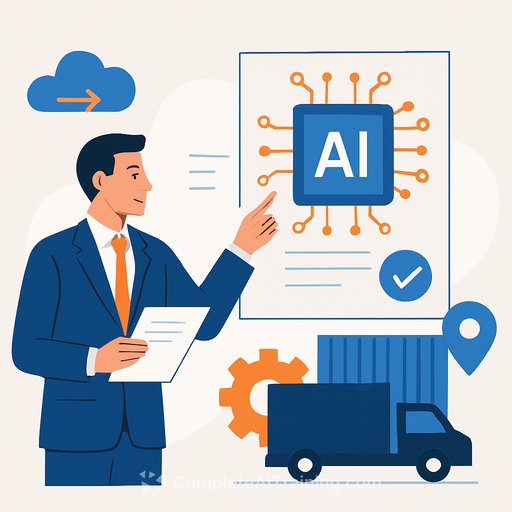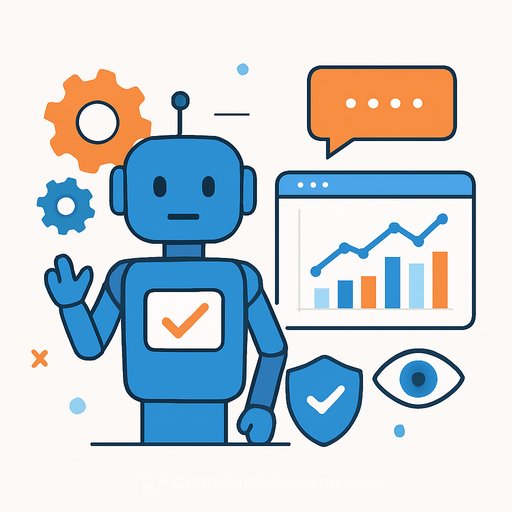AI enhances Defense Logistics Agency's end-to-end operations, CIO says
Artificial intelligence is moving from pilot projects to production across the Defense Logistics Agency, and the impact is operational. DLA CIO Adarryl Roberts called AI a force multiplier for the Department of Defense, with clear benefits in mission support, procurement, and day-to-day execution.
His message to operations leaders was blunt: accelerate adoption or fall behind. "We need to move at pace to keep up with our adversaries in China and Russia," he said at the Appian Government 2025 summit.
Why this matters for operations
DLA already processes about 10,000 automated contract orders every day. The next step is keeping purchase orders and contracts fully automated end-to-end - without constant human intervention to "kick out and fix" exceptions.
That shift frees teams from low-value reconciliation and lets them focus on planning, risk management, and mission outcomes. It's the difference between reacting to queues and running a predictive, resilient operation.
From reactive to predictive
The pandemic was a turning point. DLA moved hard toward predictive support, where AI and automation anticipate demand and bottlenecks instead of firefighting after the fact.
The agency is exploring more than 200 AI use cases, with over 55 models in production, testing, or use for demand planning and supply chain risk management.
Deterministic first, not just generative
Roberts emphasized that DLA's approach is end-to-end and doesn't rely solely on generative AI. The focus is on deterministic models that produce consistent, auditable outcomes - the kind you can trust in procurement, inventory, and transportation.
"How do we justify our investment in AI focusing on deterministic models, which lead to a high degree of confidence in the output?" That's the standard.
Beyond dashboards: AI for the edge of execution
DLA manages nine supply chains, and the goal isn't another executive dashboard. It's frontline impact. Dockworkers, buyers, and planners should feel the lift in their daily workflows - faster turns, fewer exceptions, tighter lead times.
AI should remove friction across planning, sourcing, contracting, fulfillment, and sustainment. Not just visualize it.
Put tools in operators' hands
Roberts was clear: the people closest to the mission need the tools. "We're really looking to put the AI and the automation technology in the hands of the operator, because they know the mission, they know the problem."
That requires simple interfaces, clear guardrails, and measurable outcomes tied to throughput, cost, and reliability.
Build digital acumen across the workforce
DLA is investing in "digital acumen" - data skills plus tech fluency - to create "digital citizens" who lead automation, not just use it. That's how you scale AI beyond a handful of specialists.
If your org is starting this lift, prioritize role-based training for analysts, buyers, planners, and supervisors. Make it practical: data literacy, model awareness, exception handling, and KPI ownership.
What operations leaders can do now
- Map your end-to-end process and isolate the top three exception hotspots that stall flow (e.g., PO mismatches, supplier lead-time variance, invoice errors).
- Start with deterministic models for demand forecasting, anomaly detection, and rules-driven approvals before layering in generative tools.
- Instrument every step with clear metrics: forecast error, touchless order rate, exception rate, cycle time, perfect order rate.
- Push AI to the edge: give operators decision support in the tools they already use, not just in new dashboards.
- Create a fast feedback loop: weekly reviews of false positives/negatives, model drift, and process changes.
- Build a lightweight governance lane for approvals, audit trails, and model explainability - confidence is currency.
The bigger picture
This effort aligns with DoD's broader push to scale AI with accountability and operational value. See the Department's AI initiatives via the Chief Digital and AI Office for context on policy, tooling, and best practices.
DoD Chief Digital and AI Office | Defense Logistics Agency
Upskilling your ops team
If you're building digital acumen for frontline and mid-level ops roles, curated learning paths help accelerate the shift from reactive work to predictive, exception-light execution.
AI courses by job role (Complete AI Training)
Bottom line: AI is moving from slideware to the shop floor. DLA's playbook is clear - go deterministic first, automate end-to-end, upskill the workforce, and measure what matters.
Your membership also unlocks:






